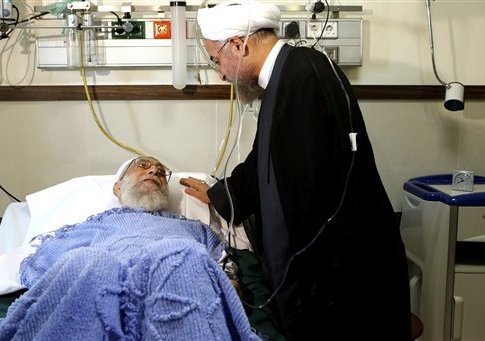Iran is on the cusp of experiencing a major political crisis as regime insiders jockey for power in what intelligence reports indicate is the coming end to Supreme Leader Ali Khamenei's 25-year reign as head of the country.
Khamenei, who rose to power as Iran's second supreme leader in 1989, was in the hospital last week to undergo prostate surgery.
The well-publicized surgery—coupled with 2010 U.S. diplomatic cables stating that Khamenei has terminal caner—suggest that the regime is "preparing the nation and the world for a transition to a third supreme leader," according to a report released by the global intelligence giant Stratfor.
With Khamenei's health in question, longtime regime insiders appear to already be paving the way for him to be replaced with an equally extremist and hardline ruler who would enter the political fray at perhaps the most significant time in Iran's history.
Various political factions are now lining up for a fight, according to Stratfor, which predicts that "the process to replace Khamenei will be marred by a major struggle between the various camps that make up the conservative establishment" in Tehran.
The latest sign that Khamenei's rule is nearing an end came earlier this month when, in a strange move, Iran heavily publicized his prostate surgery.
"The unusual public relations management of what has been described as a prostate surgery suggests Tehran may be preparing the nation and the world for a transition to a third supreme leader," Stratfor wrote in its brief. "Iranian efforts to project an atmosphere of normalcy conceal concerns among players in the Iranian political system that a power vacuum will emerge just as the Islamic republic has reached a geopolitical crossroads."
Iran’s most extremist elements are already believed to be plotting against the somewhat more moderate President Hassan Rouhani, who has made nuclear negotiations with the West among his top priorities.
"Pragmatic conservative President Hassan Rouhani's election in June 2013 elections led to a social, political, and economic reform program facing considerable resistance from within the hard-right factions within the clerical and security establishments," according to Stratfor. "The biggest issue between the presidential camp and its opponents is the ongoing process of negotiations with the United States over the Iranian nuclear program."
However, nuclear talks just scratch the surface.
Iran remains at the center of a global terrorist network that opposes Western nations and Israel. It plays a key role in bolstering Syrian President Bashar al Assad and has emerged as a major player in Iraq's efforts to combat the Islamic State of Iraq and Levant (ISIL or ISIS).
A new hardline Supreme Leader could thwart Rouhani's agenda and significantly complicate U.S. efforts in the region.
"As if the [nuclear] negotiation itself was not enough of a problem for Rouhani, the U.S. move to support rebel forces in Syria that would fight both the Islamic State and Iran's ally, the Assad regime, is a major problem for Tehran," according to Stratfor.
"U.S. and Iranian interests overlapped with regard to the IS threat in Iraq," it states. "But in Syria, the United States must rely on anti-Iranian actors to fight IS and the Obama administration seeks to topple the Assad regime Accordingly, less than a year after the two sides embarked upon a rapprochement, tensions seem to be returning."
There are also questions at this point as to whether an individual or a joint ruling council will replace Khamenei, according to regional experts.
"The real question though is not simply who will replace Khamenei but whether an individual will," said Michael Rubin, a former Pentagon adviser on Iran and Iraq. "There has always been a strain of thought that the clerical guardianship at the heart of Revolutionary leader Khomeini's vision could be a council. This would avoid the need for a full-scale factional battle but could ultimately lead to more factionalism at the top."
Stratfor's sources indicate that the main priority is maintaining the regime's extremist integrity.
"For the hardliners, already deeply unnerved by what they see as an extremely troubling moderate path adopted by Rouhani, it is imperative that the next supreme leader not be sympathetic to the president," according to the brief. "From their point of view, Khamenei has given the government far too much leeway. For his part, Rouhani knows that if his opponents get their way in the transition, his troubles promoting his domestic and foreign policy agenda could increase exponentially."
The extremist faction in Iran currently has the advantage.
The country's ruling "Assembly of Experts is consisted of very radical fundamentalist members and more conservative members," explained Saeed Ghasseminejad, an Iranian dissident and cofounder of Iranian Liberal Students and Graduates. "There are few moderates but conservative members can easily change their position if the current supreme dies and his iron fist disappears."
Reformists are almost out of the game; their best candidates are Hassan Khomeini and Hashemi Rafsanjani, who do not seem to have great chance," Ghasseminejad said.
Most agree that Iran's powerful Revolutionary Guard Corps (IRGC) will "play a key role" in appointing the next leader, according to Stratfor.
Some well-known Iranian politicians have been lobbying behind the scenes to garner the support needed to replace Khamenei, Ghasseminejad said.
One such individual is Mahmoud Hashemi Shahroudi, the former head of Iran's judiciary branch. The current head of the judiciary, Sadeq Larijani, also is in the running, he said.
Rouhani himself is seen as "a less visible candidate," according to Ghasseminejad. "His conservative credentials along with his intelligence and security background, his popular support, and his calculated distance from reformists makes him hopeful that he may have a chance."
